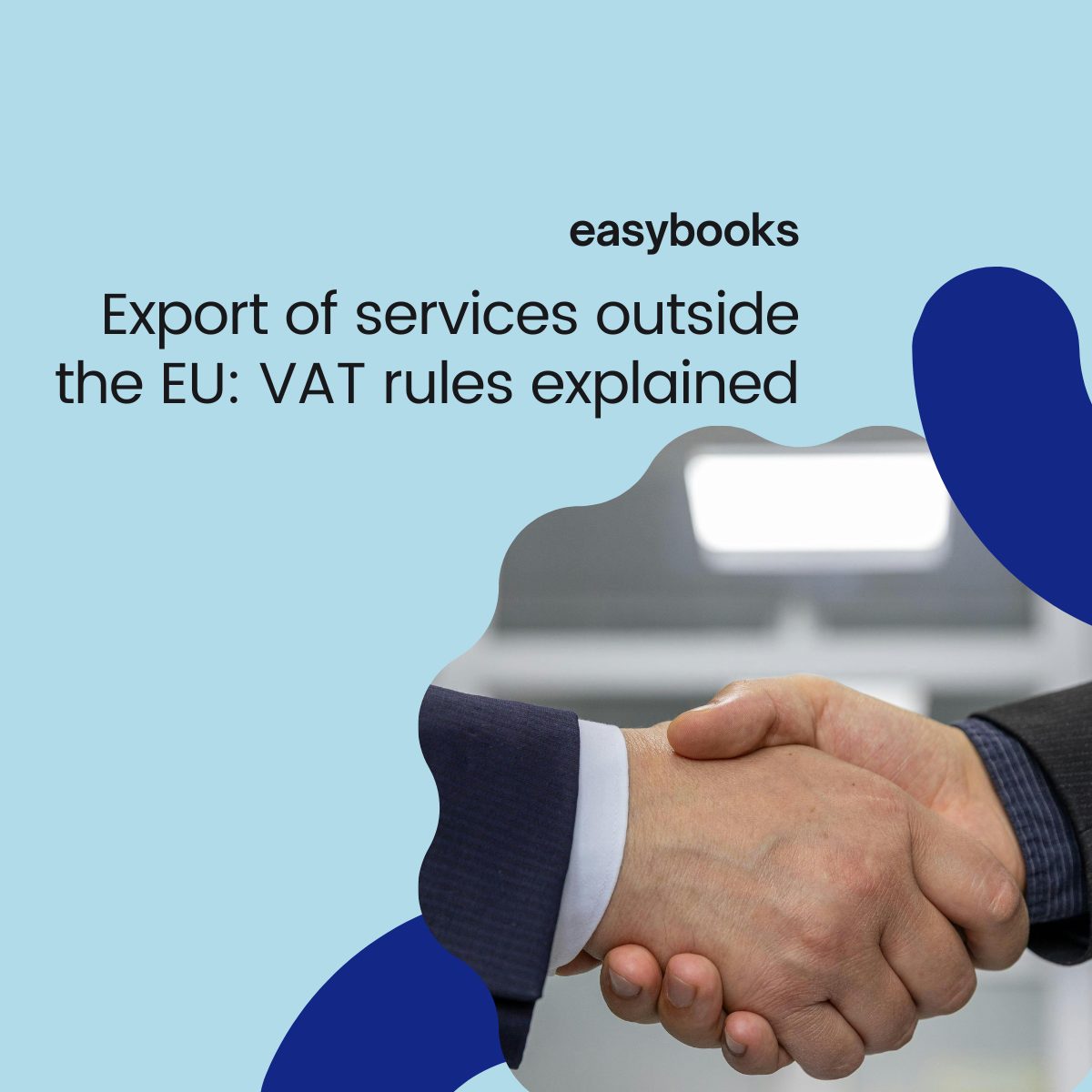Export of services outside the EU: VAT rules explained
Export of services outside the EU has become more significant than ever. Providing services to international clients, whether in the United States or Asia – offers tremendous growth potential but also introduces additional tax, accounting, and compliance challenges.
One of the most common questions entrepreneurs face is: How should I handle VAT when exporting services outside the EU? The issue is far from trivial, as the correct tax treatment depends not on where the service is performed, but on where it is considered “supplied” for VAT purposes.
For comprehensive professional assistance with these matters, you may consult our accounting services or explore our HR & payroll services.
What is the export of services outside the UE?
The term “export of services” is commonly used in business practice to describe the provision of services by a Polish entrepreneur to a client located outside the European Union (a so-called “third country”).
Although the Polish VAT Act no longer formally uses this term, it remains widely employed for simplicity. In legal terms, such transactions are referred to as “services for which the place of supply is located outside the territory of Poland”.
The key principle is that the place of supply determines where VAT is due, regardless of where the service is physically performed.
Determining the place of supply for exported services
The rules for determining the place of supply of services are specified in Articles 28b-28n of the VAT Act. The correct classification of a transaction relies on whether it is a B2B or B2C service.
B2B services – transactions between entrepreneurs
According to Article 28b of the VAT Act, if the Polish business provides a service to a foreign entrepreneur located outside the EU, the place of supply is deemed to be the country where the recipient has its registered office or permanent establishment.
This means that the service is not subject to VAT in Poland. The foreign buyer, however, may be required to settle the equivalent of VAT in their own country, usually under the reverse charge mechanism.
For example, if a Polish consulting firm provides strategic advisory services to a company based in Canada, the service does not fall under Polish VAT, and the Canadian company settles any local tax obligations.
Exceptions to the general rule
While the principle described above applies to most services, certain types are governed by specific rules defining the place of supply. Examples include:
- real estate services – taxed in the country where the property is located,
- cultural, educational, or entertainment services – taxed where they are physically carried out,
- passenger transport services – taxed proportionally along the route.
These exceptions ensure the VAT reflects the economic substance of the service rather than merely contractual location of the parties involved.
B2C services – transactions with private consumers
In case of B2C services, the place of supply is generally the country in which the consumer resides or has their habitual place of stay.
This rule applies to, among others:
- intellectual property services (licensing, copyright, trademarks),
- consulting, legal, accounting, and translation services,
- advertising and digital marketing,
- IT, financial and insurance services,
- leasing of movable property other than transport vehicles.
If a Polish entrepreneur provides such services to a client residing outside the EU, the transaction is typically taxable in the recipient’s country and not in Poland.
VAT treatment of services exported outside the EU
When the place of supply is located outside Poland, the transaction is not subject to VAT in Poland. It is important to distinguish this from VAT-exempt transactions, which remain within the scope of VAT but benefit from an exemption. In contrast, exported services are considered outside the Polish VAT system. It means that the supplier:
- does not charge VAT on the invoice,
- includes the note “Reverse charge” or “Service not subject to VAT in Poland – Article 28b of the VAT Act”,
- may still declare the transaction in VAT reporting forms (for statistical and transparency purposes)
How to issue an invoice for the export of services?
The invoice issued for the export of services to non-EU countries must meet several formal requirements. It should contain:
- the full details of the supplier and the foreign client,
- the date of issue and service description,
- the net amount (without VAT) an explanatory note – “Not subject to VAT in Poland under Article 28b of the VAT Act”,
- currency and exchange rate (based on the average NBP rate from the last business day before the invoice date or tax liability date).
If the client is responsible for accounting for VAT locally, the phrase “Reverse charge” should also appear on the invoice.
Remember! If you regularly issue invoices to foreign clients in multiple currencies, consider outsourcing invoiving to an external provider such as Easybooks with our accounting services. We ensure that each transaction complies with both Polish and international tax law.
Documentation requirements
Accurate documentation is crucial to verify that the place of supply was located outside of Poland.
In the event of tax audit, the following evidence should be available:
- a contract or order confirmation,
- proof of service delivery (e.g., reports, deliverables, correspondence),
- payment confirmation,
- documentation confirming that the buyer is a foreign entity (e.g., company registration, website, or tax ID).
Maintaining accurate and complete documentation provides legal certainty and helps prevent disputes with tax authorities.
Reporting exported services in VAT returns
Even though the exported service is not subject to Polish VAT, it still must be reported in the JPK_V7 file and in the VAT declaration under section: “Services provided outside the territory of the country”.
This entry is informational and does not generate VAT payable in Poland. If the transaction is denominated in a foreign currency, the value should be converted into PLN using the average NBP exchange rate from the last business day before the invoice date or before the tax obligation arises.
Common mistakes and how to avoid them
When it comes to export of services outside the EU, even minor errors can have costly consequences. The most frequent mistakes include:
- charging Polish VAT incorrectly – always verify whether the place of supply is indeed outside Poland before applying any VAT rate.
- failing to include a reverse charge note – missing this element can create issues for the foreign client’s tax reporting.
- insufficient documentation – lack of written contracts, proof of payment, or evidence of service delivery can result in disputes.
- misidentifying the client’s status – confirm whether your client qualifies as a business entity or an individual, as this affects VAT treatment.
For entrepreneurs unsure of the correct approach, professional accounting support can help ensure full compliance and accurate reporting.
Export of services and its benefits for entrepreneurs
Engaging in the export of services outside the EU offers numerous business advantages. It enables access to new markets, diversification of income streams, and collaboration with global clients.
From a tax perspective, such transactions can also improve liquidity, as VAT is not charged in Poland, meaning there is no obligation to pre-finance tax on unpaid invoices.
However, expanding internationally also entails additional administrative duties. Entrepreneurs should ensure their contracts, invoices, and accounting systems align with both Polish VAT law and the foreign jurisdiction’s tax requirements. Partnering with us in accounting can significantly simplify this process and reduce compliance risks.
Contact us, if you need additional support in Accounting and HR & Payroll services.
Text based on: INFORLEX
Read our latest Posts
We love to talk to you!
Contact Us!
Explore EasyBooks for top notch accounting services. Reach out to us today for personalized assistance!




